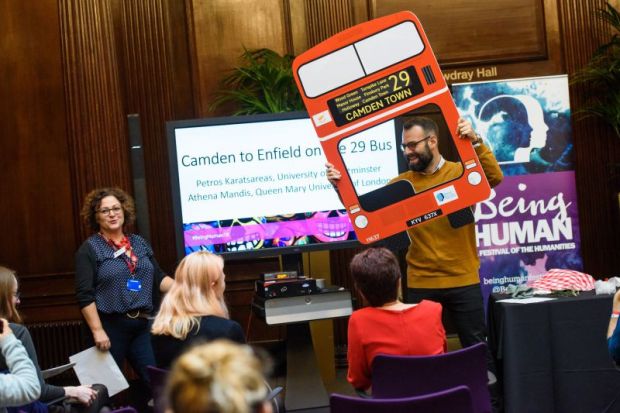There will be a comedy performance called A Bloody Good Show! exploring taboos around menstruation. A tour of Greek Cypriot London following the route of the 29 bus. And even a place where one can put on a mixed reality headset and items from a “genderqueer wardrobe” to explore whether we are heading for a future where gender no longer matters.
This is just a tiny sample of what is coming up as part of the fifth Being Human Festival of the Humanities, led by the University of London’s School of Advanced Study in partnership with the Arts and Humanities Research Council and the British Academy. Taking place from 15 to 24 November, it consists of 250 events involving 73 universities, research organisations and cultural and community groups across the UK.
Academics participating in the events had a range of views about how such projects can not only showcase research but stimulate scholarship too.
And, for the first time, the event boasts separate international hubs, at the University of Melbourne and Princeton University, meaning that it also sheds light on how attitudes to public engagement differ around the world.
Dead Famous, an evening of talks, screenings and music organised by Laura O’Brien, senior lecturer in modern European history at Northumbria University, arises from her own and others’ long-standing interest in “celebrities” – from Napoleon to Elvis Presley – who “were believed to have ‘lived on’ in literal terms”. The topic “lends itself perfectly to public engagement,” she explained, because “at the heart of what we’re trying to understand is why these stories exist, why they circulate about some figures and not others, and what this says about fame and celebrity”.
The event should drive further research through the creation of a new “cluster” dedicated to “pseudo-death” (the idea that someone did not really die) and “pseudo-cide” (faking one’s own death). “One of my colleagues has ended up writing a journal article on [Irish politician] Charles Stewart Parnell and pseudo-cide, as a result of his preparations for Being Human, which is a relatively unusual case of public engagement encouraging new research,” she said.
Nadia Valman, reader in English literature at Queen Mary University of London, has joined forces with artist Karen Crosby for an event designed to “reanimate the [former Royal London] Hospital with the ghosts of its past”. In previous years, she has led a series of literary walks for the festival. These will form the basis for an impact case study within the research excellence framework. Yet she also claimed that “the experience of communicating with motivated adult learners has helped me frame my research questions more clearly”, “made it easier for me to write for non-academic readerships” and “bolder in engaging with students about what they enjoy and don’t enjoy”.
The London, Sugar & Slavery gallery at the Museum of London Docklands, said Matt Martin, Stuart Hall research scholar at Birkbeck, University of London, was both “groundbreaking in its recognition of black and mixed race activism in the struggle against slavery” and “unusual in the prominence it gives to the written and spoken word as vehicles for resistance”. A visit to the gallery spurred his research on “how poets have used the Caribbean’s distinctive forms of speech…to challenge racist and imperialist assumptions”. He has now returned to lead a guided tour “around some of the gallery’s key exhibits; at each stop, we will explore a historical poem that gives voice to that object or image”.
Reaching out in this way should enable Dr Martin to tap into widespread interest in “struggles against transatlantic slavery, as well as against more recent racism” and to ensure that his research remains relevant by “listen[ing] to people who have a personal stake in these issues”. Furthermore, “by performing some of the texts in collaboration with the audience”, he hoped to “be able to develop my thinking about how these poems were shared and received”.
Meanwhile at Melbourne, Hansen lecturer in history Una McIlvenna researches execution ballads. In the 18th century, when the British started shipping criminals to Australia instead of executing them, “the ballads become about transportation and this new penal colony”, she said. Given that people “love to sing” and are “always fascinated by public execution and true crime”, she has therefore joined forces with local singer Lisa Salvo for an event titled “Bound for Botany Bay: Singing Australia’s Convict History”.
Although there are fewer direct incentives to do public engagement events than in the UK, Dr McIlvenna’s position was established by a donation specifically to “develop and instil a passion for history within the broader community” and she was “hired (among other reasons) because of my experience in, and passion for, public engagement”.
“If universities want their researchers to do more public engagement, then they do need to provide admin support to look after the many facets of organising an event (as the University of Melbourne has done for me),” added Dr McIlvenna.
后记
Print headline: Engagement: not simply nice to have, but the next step in scholarly enquiry?





